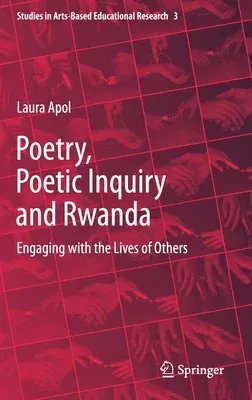Laura Apol
(Author)Poetry, Poetic Inquiry and Rwanda: Engaging with the Lives of Others (2021)Hardcover - 2021, 10 November 2020

Qty
1
Turbo
Ships in 2 - 3 days
In Stock
Free Delivery
Cash on Delivery
15 Days
Free Returns
Secure Checkout

Part of Series
Studies in Arts-Based Educational Research
Print Length
118 pages
Language
English
Publisher
Springer
Date Published
10 Nov 2020
ISBN-10
3030565610
ISBN-13
9783030565619
Description
Product Details
Author:
Book Edition:
2021
Book Format:
Hardcover
Country of Origin:
NL
Date Published:
10 November 2020
Dimensions:
23.39 x
15.6 x
0.97 cm
ISBN-10:
3030565610
ISBN-13:
9783030565619
Language:
English
Location:
Cham
Pages:
118
Publisher:
Weight:
371.95 gm